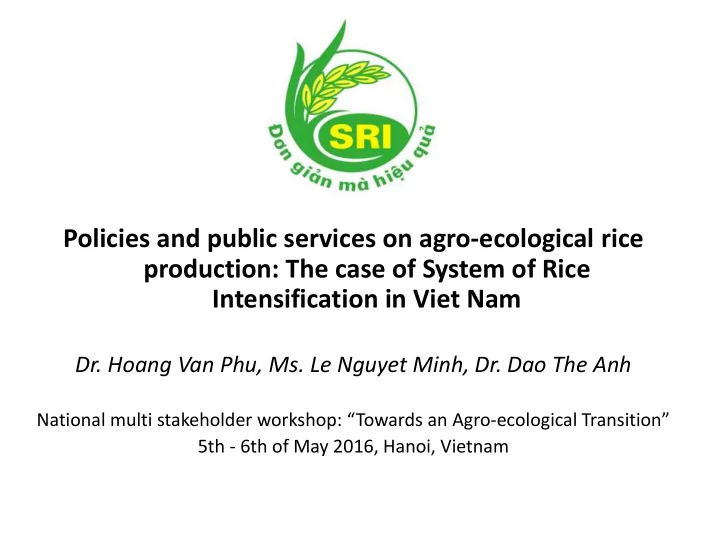

Policies and public services on agro-ecological rice production: The case of System of Rice Intensification in Viet Nam Dr. Hoang Van Phu, Ms. Le Nguyet Minh, Dr. Dao The Anh National multi stakeholder workshop: “Towards an Agro-ecological Transition” 5th - 6th of May 2016, Hanoi, Vietnam
Map of SRI in the World
SRI principles Carefully transplant single seedlings at two-leaf stage (8-12 days). • Plant seedlings at a distance of 20- 25 cm or more in a square pattern • Fertilize with compost, add chemical fertilizer only if needed • Keep soil moist and aerated .
Highlight of sri adoption • SRI adoption in 5 countries who produce 2/3 of world’s rice (India, Vietnam, China, Indonesia, Cambodia). • About 9.5 million farmers use SRI in 3.4 million ha. • Estimate value of SRI increased production: $862.5 million. http://sri.ciifad.cornell.edu/
Map of SRI in Vietnam (Source: IAE)
Building capacity and promoting farmer’s collaboration
Results to date 2003: IPM introduced SRI in Vietnam 2006: 3.450 farmers applied SRI 2007: MARD acknowledged SRI as technological advancement 2009: 264,000 farmers & 85,422 ha 2011: 1,070,384 farmers & 185,065 ha 2013: 1,803,200 farmers & 366,951 ha 2014: 1,813,201 farmers & 394,894 ha Led by Plant Protection Dept. with Farmer Union, Extension Center. Academia : Thai Nguyen (ICC), Hue Uni, Hanoi Ag Uni, Field Crop Research Institute / FCRI, CASRAD, Institute of Ag Environment - IAE CSO: Oxfam, SNV, VECO, FIDR, SRD, World Vision
Challenges & opportunities in creating enabling environment Challenges: • SRI is principle-based rather than prescriptive (challenge the top-down extension and farmer mindset). • Land fragmentations and water management • Difficulty in evaluating SRI adoption at the large scale. • Reconsideration of economic growth model less priority. Opportunities • Farmers are anxious about profit margins and paddy environment • There is political will to maintain a viable, green rice sector • Extension sector is well established.
Good & not-s0-good practices in creating viable enabling environment • Two-tiered extension (FFS, key farmer network) • Diverse, innovative communication (field day, farmer ambassador, art performance, media) • A variety of collaboration modes at the local level • Effective M&E along the scaling up pathways. • Influencing policy space (MARD’s endorsement ) • Narrowly-focused (seed, fertilizer, mechanization) packages; Conflicting, poorly-coordinated policy & extension policies. • Adoption skewed in rice-progressive areas. • Lack of studies for specific agro-ecological zones. • Lack of evaluation of policy’s effectiveness and impacts.
Key Messages • Farmer-led innovations and consumer’s support will be key to developing a fair and sustainable (rice) food system. • Farmers need and benefit most from safe, low-input, readily accessible, viable solutions. • Effective policies, incentive mechanisms, accountability and farmer outreach are vital to adoption. • Stakeholder collaboration and alignment are fundamental to wide-scale impact. • Creating synergies with networks (SRP, CANSEA, ALiSEA)
Vietnam SRI network (SRIViet) • Founded in 2015 (Oxfam, SNV, ICC-TNU, FCRI, CASRAD, IAE, Veco, FIDR, PPDs, SRD). • SRIViet is linked with global SRI network. • SRIViet offers to lead regional exchanges, dialogue and collaboration of national SRI networks in ASEAN. • Mission : A knowledge hub for SRI and sustainable rice interests to share information, research and resources in order to enhance voice of rice producers, advocacy of enabling policy & support
Viet-SRI Network Dr. Hoàng Văn Phụ , Le Nguyet Minh, Dr. Dao The Anh Coodinator SRIViet Email. hoangphu1958@gmail.com Tel. 0912141837
Recommend
More recommend